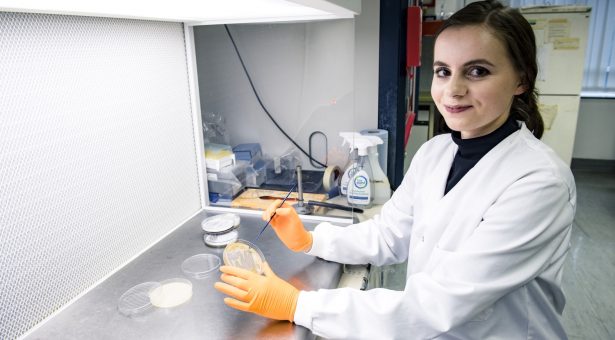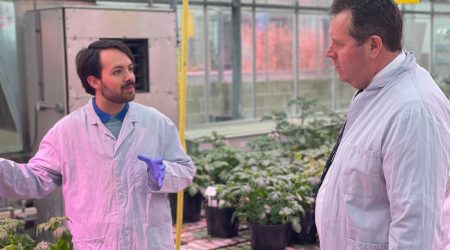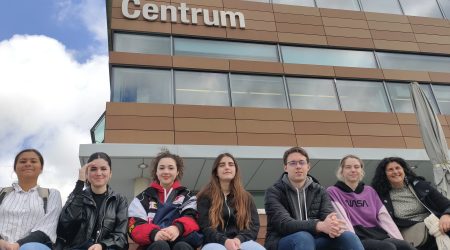A PhD Community; the John Innes Centre Student Voice

Alicia Russell is both a fourth year PhD Student here at the John Innes Centre and chair of the Student Voice committee, which provides support and representation for our PhD students, plus the odd board game and pizza night.
We sat down with her to ask what the Student Voice does and how she finds balancing her role as Chair with studying for her PhD.
“I have just started the fourth year of my PhD working in the Dr Andrew Truman lab, working in molecular microbiology, where my research focuses on the discovery of novel natural products from Streptomyces bacteria. Streptomyces produce lots of useful molecules such as antibiotics and anticancer compounds, so it’s really important and interesting to try and find new molecules from these bacteria.
In particular, I’m interested in a class of natural products called RiPPs (Ribosomally synthesised and Post-translationally modified Peptides). I use a combination of bioinformatics, genetics and chemistry, to identify biosynthetic gene clusters and characterise the molecules produced by them.
Essentially the aim of my research is to identify new molecules, further our understanding of the biosynthesis of natural products, and to use this information to help inform the discovery of further novel molecules.
The John Innes Centre Student Voice, known as the JSV, is a committee of students that provides a focal point for the large student community here at the John Innes Centre. As well as organising a number of social, academic and welfare events, we liaise with the other committees and departments on-site, including directly with the Director Dale Sanders, all of which ensures that students have a voice and a seat at the table.
The JSV is a committee, the make-up of which changes every year with an election. Each new person brings their own ideas of things they would like to try out, so there is always something new and exciting coming up. Within the committee people are responsible for different aspects and we all help each other out, so while doing a PhD is a lot of work, there’s still time to get involved, you just need to be organised.
As well as providing students with representation, we also provide an outlet and support network to discuss, and hopefully resolve, any issues that crop up for people.
Doing a PhD, particularly when you’re likely to be moving to a new place, especially somewhere like the John Innes Centre where it’s a big institute, with lots of new people to meet, it can be a little daunting, so we are here to provide another friendly face and help bring people together. When people first arrive here, we help to organise welcome social events for students across the institutes, so people are straight away brought together.
Every year we also play a role in the Annual Science Meeting (ASM), which happens a few weeks after the latest PhD students have started. We help to organise the poster sessions and a cheese and wine social on the first evening. The ASM brings together the entire institute for a series of mini lectures, covering the full diversity of plant and microbial science that is being done here. As such, new PhD students are given an insight into the entire institute, as well as the opportunity to meet and chat to scientists working on things similar to their own projects.
I have learned that as a PhD student you have so many opportunities available to you. If you say yes to stuff and get involved, you’ll find lots of doors opening that you might not have even realised were there. Conferences and academic societies, as well as committees and volunteering and outreach, there is always something you can do and as a student you can make your PhD, what you want, so get out there and try lots of things.
We also collaborate with the other student groups in the other institutes on the Norwich Research Park. Each year, we help to co-organise Christmas and Summer parties, a joint student Easter social as well as the more frequent socials like board game nights. We also organise annual away days such as go-karting or trips to the zoo.
I love research and I love the field of microbiology that I am working in, so when I finish my PhD I think I’d like to do a Post Doc. However, I am seeing lots of other options too, so who knows? Whatever I do, I love science and definitely want to stay in science.
That’s surprising, because at school I didn’t really like science, so I never wanted to be a scientist when I was growing up. It was one of my worst subjects; I always preferred music and art.
When I got to the end of secondary school I worked hard at science, for no reason other than I wanted good grades, but then suddenly with chemistry something clicked. As I studied it further, I found that actually with science, the stuff you are learning at GCSE level is so broad it is a little dull, but as I began to learn more detailed stuff, I found it was more and more interesting. I am still finding that now, the more detail you get into, the more interesting I am finding it.
Through doing a PhD I have learned that everybody’s project is different, so not to compare myself with other people. It is really easy to look at what other people are doing and wonder why you’re not getting as many results, or why they seem to be making lots of progress when you’re stuck, or things aren’t working out the way you hoped. It’s also easy to think you’re not intelligent enough to be here, but I think imposter syndrome is a very normal feeling in science.
Everyone is different and every project is different, so all you can do is focus on what you’re good at, what you love about your project, and the bigger picture of why you’re working on it. If you do that, it should all work out in the end.”
Alicia’s studentship is funded by the BBSRC Norwich Research Park Biosciences Doctoral Training Partnership.



